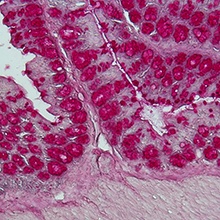The role of the microbiota in preventing allergies
The human body is inhabited by billions of symbiotic bacteria, carrying a diversity that is unique to each individual. The microbiota is involved in many mechanisms, including digestion, vitamin synthesis and host defense. It is well established that a loss of bacterial symbionts promotes the development of allergies. Scientists at Helmholtz Zentrum Munich, at the Technical University of Munich (TUM), and Institut Pasteur in Paris have succeeded in explaining this phenomenon, and demonstrate how the microbiota acts on the balance of the immune system: the presence of microbes specifically blocks the immune cells responsible for triggering allergies.

The hygiene hypothesis suggests a link between the decline in infectious diseases and the increase in allergic diseases in industrialized countries. Improvements in hygiene levels necessarily lead to reduced contact with microbes that is paralleled by an increased incidence in allergic and autoimmune diseases, such as type 1 diabetes. Epidemiological studies have substantiated this hypothesis, by showing that children living in contact with farm animals – and therefore with more microbial agents – develop fewer allergies during their lifetime. Conversely, experimental studies have shown that administering antibiotics to mice within the first days of life results in a loss of microbiota, and subsequently, in an increased incidence in allergy. However, until now, the biological mechanisms underlying this phenomenon remained unclear.
Microbiota is essential for preventing allergies
In this study published in Science, the team around Dr. Caspar Ohnmacht at Center of Allergy and Environment (ZAUM) of Technical University of Munich and Helmholtz Zentrum Munich and around Gérard Eberl, head of the Microenvironment and Immunity Unit at the Institut Pasteur, shows that, in mice, symbiotic intestinal microbes act on the immune system by blocking allergic reactions. Several types of immune response can be generated in order to defend the organism. The presence of bacterial or fungal microbes provokes a response from immune cells known as type 3 cells. These immune cells coordinate the phagocytosis and killing of the microbes.
However, in the case of infection by pathogenic agents that are too large to be handled by type 3 cells (such as parasitic worms and certain allergens), the cells that organize the elimination of the pathogen, but also allergic reactions, are known as type 2 cells. In this study, scientists at the Institut Pasteur have shown that type 3 cells activated during a microbial aggression act directly on type 2 cells and block their activity. Type 2 cells are consequently unable to generate allergic immune responses. This work demonstrates that the microbiota indirectly regulates type 2 immune responses by inducing type 3 cells.
These results explain how an imbalance in microbiota triggers an exaggerated type 2 immune response normally used to fight large parasites, but that also leads to allergic responses. Ohnmacht summarizes: “These findings represent an important milestone in understanding the balance between our various defense mechanisms. In terms of allergy treatment, a hitherto unexplored therapeutic approach consists therefore in stimulating type 3 cells by mimicking a microbial antigen in order to block allergy-causing type 2 cells.”
Original Publication:
Ohnmacht, C. et al. (2015). The microbiota regulates type 2 immunity through RORgt+ T cells, Science, DOI: 10.1126/science.aac4263
Source: Helmholtz Zentrum Munich
30.07.2015






